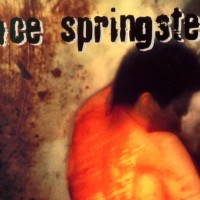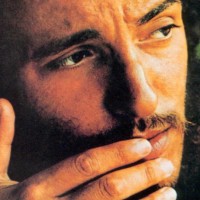It had been five long years when Bruce Springsteen’s Human Touch arrived alongside Lucky Town on March 31, 1992, more than that if my disappointment with Tunnel of Love is to be considered.
The E Street Band wasn’t in sight and that just made a person wonder what the heck Springsteen was up to. Record release day had more than the usual spark of energy, especially since we’d learned that Springsteen would be delivering two separate albums. And “separate” is really the key word here, with Human Touch being the more commercial-sounding of the two.
Until Working on a Dream came out, many people have said Human Touch was his worst record. Another popular opinion (and one that I used to share) is that the two albums would have made one great album if combined, but with the “filler” tossed aside.
Yes, I used to feel that way. But more recent listens have given me a different appreciation for that era. It sure was different, especially seeing Bruce Springsteen front a completely different band. (I saw two shows on that tour.) Despite the touches of slickness here and there, it was refreshing to hear music that leaned unreservedly toward rock.
Here’s a look at five deep-cut favorites from Human Touch and Lucky Town that prove the point:
“WITH EVERY WISH”
Here, Bruce Springsteen presents a variation on “be careful of what you wish for …,” turned sideways as “… with every wish comes a curse.” We want that job, no matter what it might do to us. We want that person, even if they’re not “the one.” The thing is, for the most part we really can’t help what we wish for, especially where matters of the heart of concerned. The longing can push us toward a decision.
In Buddhism, the concept of detachment is supposed to free us from such desires. I’ve found that impossible to apply in these situations. It can be such a difficult call … and one made on our own, because only we can decide what is “right” (or so we think).
I have no idea if this was Bruce’s intent, but the muted trumpet played here (by Mark Isham) accentuates those lonely feelings that can come with regret. It also provides sonic counter point to our protagonist, who knows he’ll be taking another risk: because he has to. When Bruce Springsteen played this live at Brendan Byrne Arena in 1992, he introduced it as a sort of fairytale. Makes sense to me, as life does feel like that from time to time.
“ROLL OF THE DICE”
For a few seconds here, you might be fooled into thinking this was the E Street Band. An aggressive snap-roll of the drums, a single guitar chord, and a joyous piano figure sure did sound about right. It turns out that Roy Bittan wrote the music with Bruce Springsteen supplying the lyrics, so that initial reaction made sense. It’s not surprising then that this song ended up being my favorite on the album.
There are a couple of things that strike me about an extended in-concert rave-up like this one. First, is Bruce Springsteen’s delivery of the redemption story, which starts off with the question “have you ever been so lost?” and ends up, a few iterations later, asking about facing emptiness: “Have you ever felt so empty … that you weren’t sure who you were anymore?” That emptiness rode along with Bruce as he dismissed the E Street Band and faced an uncertain future.
Second: preachin’ the gospel. There are definite echoes of that 1992 performance (in which Bobby King just kills) in Springsteen’s modern-day delivery. Some fans have grown tired of this, slapping on the label “preacher schtick.” I just see it as an extension of some of Bruce’s own influences: James Brown, Sam & Dave.
“LUCKY TOWN”
The shift in mood from Human Touch to Lucky Town was palpable. So many of the characters on the former record were trapped and confused in their surroundings. But here? Here we have a protagonist celebrating what seems like a new beginning.
Singing with renewed confidence and amped-up Duane Eddy twang (some folks hate the twang — instrumental and vocal — and I never understood that), the darkness of the past is stripped of its power by a brighter future.
Fans have always wondered why Bruce has neglected the material from this record. I’ve wondered myself. I mean, it does seem that it meshes so well with themes of, say, Wrecking Ball.
“LOCAL HERO”
Bruce Springsteen’s account of happening onto his portrait at a five and dime makes me think of what it must be like to attain that (or any!) level of celebrity. I mean, on Saturday morning we’ll wander down to the farmer’s market in the center of town, coming away with some carrots, garlic, cabbage, and handmade soap. Then it was back to the car a few other errands. Fifteen simple minutes spent attending to life’s necessities. So what happens when celebrity complicates things?
Springsteen wasn’t addressing that issue in “Local Hero,” though he does reference the changes he’d been through — and the associated fan reactions — with the lines “First they made me the king then they made me pope/Then they brought the rope.” To be Bruce Springsteen in the post-Born in the U.S.A. era was to be a person under a withering microscope. In that time period there was a crumbling marriage, a fired band, a new band, and then signs of hope. It’s hard enough for a “regular” person to go through these things, but in the relentless sight of the public eye? No, thanks.
The issues of those “lost years” aside, Bruce has seemed to cope with his celebrity quite well, though not completely unscathed. His ability to maintain creative focus above life’s intrusions has always been an inspiration.
“MY BEAUTIFUL REWARD”
An introspective (if slightly opaque) finale to Lucky Town, “My Beautiful Reward” finds our man summarizing the current chapter of his life. Things were bad, he did some soul-searching, and then everything took a turn for the better.
I find myself defending Bruce Springsteen when discussions get to the “Oh, he’s just a poor little rich man” stage. Does Bruce need to be defended? Of course not. But I’ll defend anybody against a detractor who will follow a line of “reasoning” based on false premises. Whether those premises involve politics, personality, or financial status is beside the point. We just cannot know somebody based on second- and third-hand reporting.
That said, people use art for all sorts of reasons, and put pieces of it into contexts that are far beyond the artist’s control. A song’s meaning can change over time; one resolution can easily sit alongside other meanings that show up under different circumstances. For me, songs like this are great examples of the power of the craft. I assume that it’s about the resolution in Bruce Springsteen’s personal life, and that completes the story in my head of what he was going through at the time. I make that assumption because it works for me.
- Why the Rolling Stones’ Harrowing ‘Gimme Shelter’ is Still Revealing New Depths - November 18, 2024
- How Talking Heads’ ‘Fear of Music’ Opened Up a World of Art and Sound - August 5, 2024
- How Deep Cuts Propelled Bruce Springsteen’s ‘Born in the U.S.A.’ - June 4, 2024




